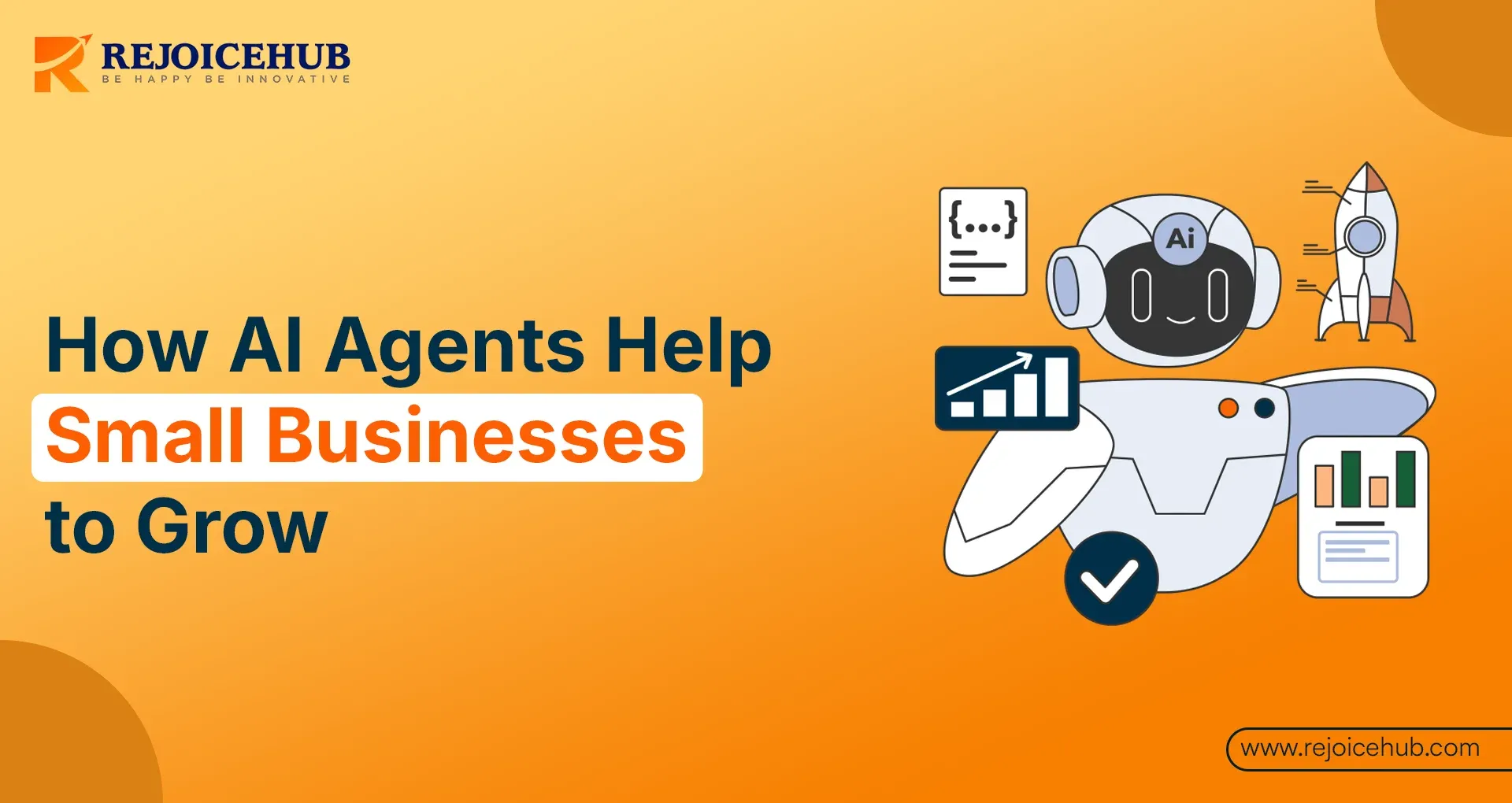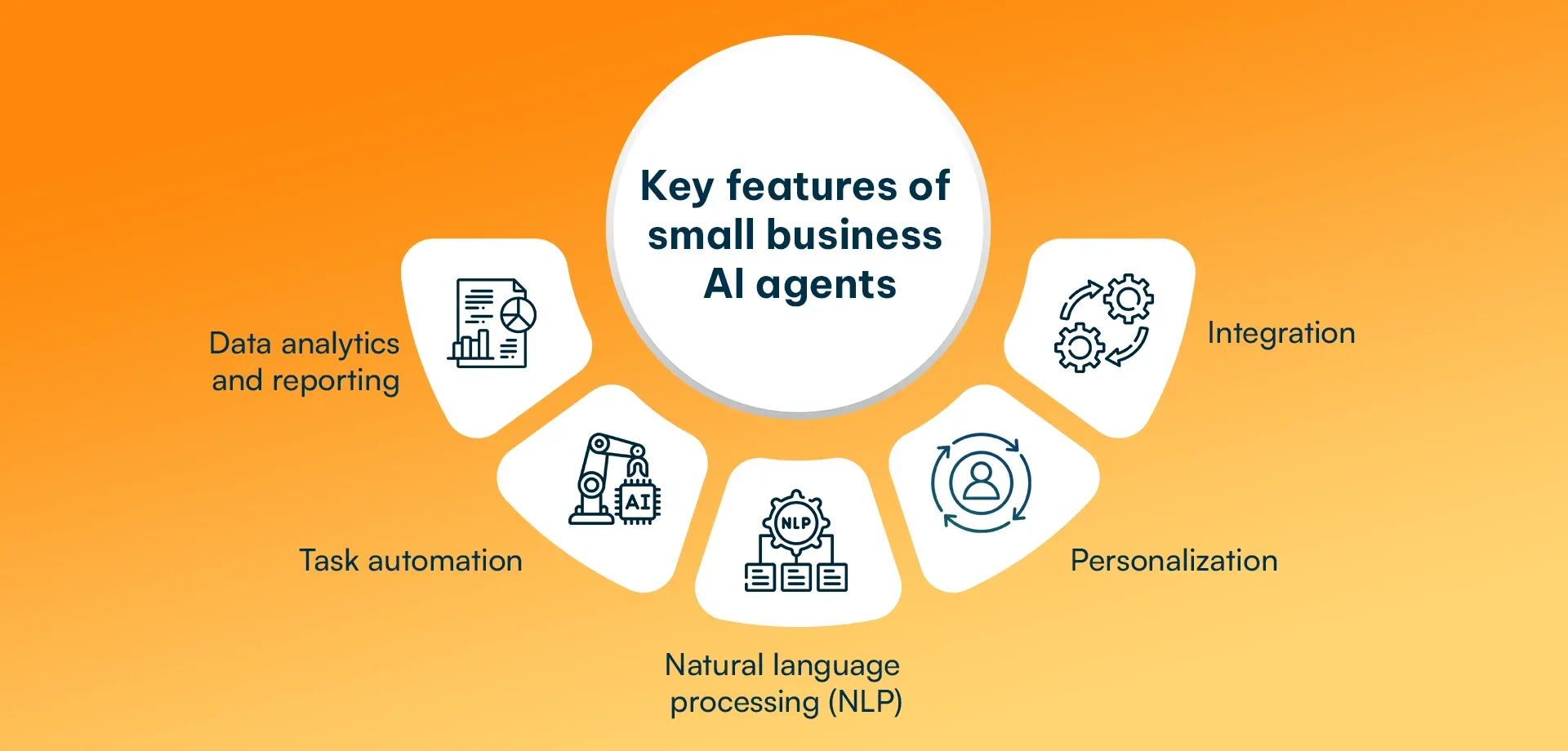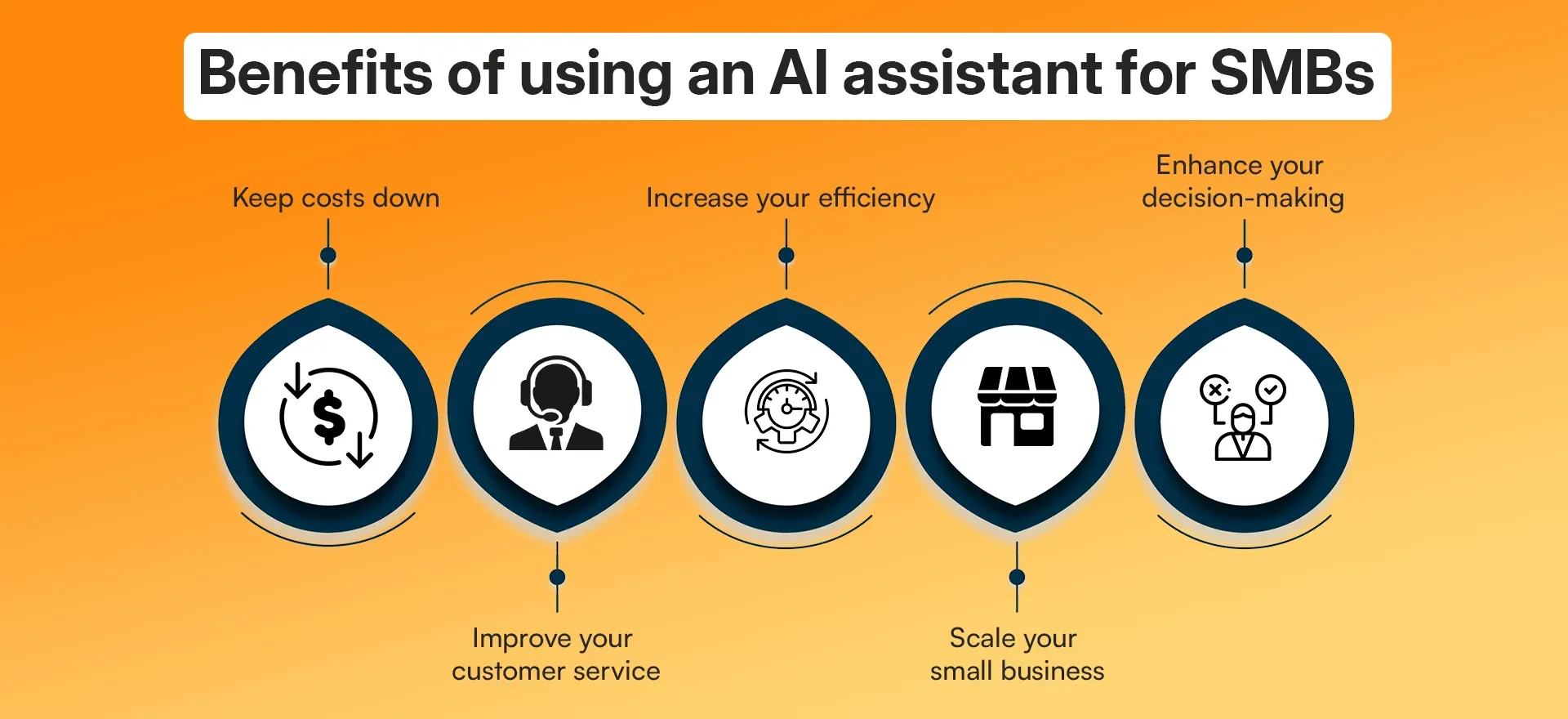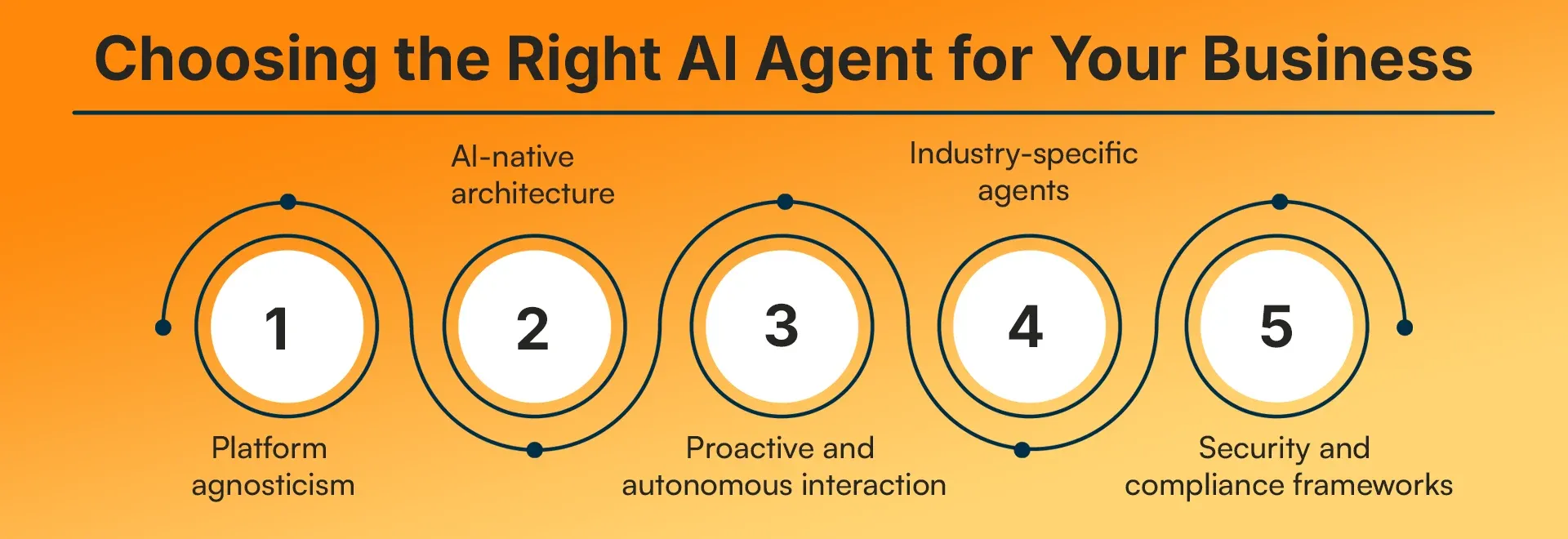
I have seen many small business owners locally who manage most of the tasks single-handedly, whether it is responding to customer inquiries or managing inventory and marketing their products on social media. Such business owners operate their businesses without any strategic planning, due to which their productivity and business performance quality deteriorate significantly.
There are approximately 63 million small businesses in India, so you can imagine how many owners must be struggling on a daily basis, and if you are also a business owner, then you will not have to bear this stress now, because there are many AI agents that you can use for repetitive tasks of your business.
Today, in this detailed article, we will know what AI agents are, how they work and what benefits or challenges small businesses may have to face from this.
Quick Summary
You can call AI agents intelligent software solutions that can automate repetitive tasks and can also interact with customers according to the data of the business operation by analyzing it, and it can mimic human conversation very well. When all these operations are automated, it reduces the cost and time of small businesses. And business owners can use this time to scale their business.
Small businesses are also preferring AI agents because AI agents can automate operations like cost savings, process automation, improved customer experiences, and data-driven insights without human management.
Our Focus in this Article:
- What are AI agents, and how do they work?
- Why are small businesses preferring it, and what benefits are they getting from it?
- What challenges can AI agents create for small businesses?
- What future scope can AI agents have for small businesses?
What is an AI Agent for a Small Business?
At its core, an AI agent is a software program designed to perform specific tasks autonomously or semi-autonomously. Think of it as a digital employee that can process information, make decisions, and execute actions without needing constant supervision. Unlike traditional software, AI agents leverage advanced technologies like machine learning (ML), natural language processing (NLP), and rule-based logic to adapt and improve over time.
There are many types of AI agents, and some are also industry-specific, and the quality of all AI varies from model to model.
For small businesses, AI agents come in various forms:
- Customer service chatbots are available 24/7 to handle inquiries and support customers around the clock.
- Marketing assistants who generate engaging content and personalize email campaigns to boost conversions.
- Data analysts are AI agents who analyze numbers and trends to deliver clear, actionable insights.
- Task automation tools take care of routine work like scheduling appointments, sending invoices, and updating records automatically.
- The effectiveness of AI agents lies in their versatility. Whether you run a boutique e-commerce store, a local service business, or a consultancy, you can train these agents to fit your needs.
For example, a bakery might use an AI agent to manage online orders and suggest upsells, while a freelance graphic designer could deploy one to automate client follow-ups and invoicing. All industries have different needs for AI agents, and their business operations also vary a lot.
AI agents are also democratizing technology. Due to no-code platforms and affordable subscription models, you don’t need a tech background or a huge budget to get started. They’re designed to integrate seamlessly with tools you already use, like Shopify, QuickBooks, or Google Workspace, making them a practical addition to any small business toolkit.
How AI Agents for Business Work
Understanding the mechanics of AI agents can increase their capabilities and help you leverage them effectively. At a high level, AI agents operate through a three-step process: perception, processing, and action. Let us try to understand this in detail.
1. Perception: AI agents gather data from their environment or the company’s CRM. This could be customer messages, website traffic, inventory levels, or social media interactions
For instance, a chatbot perceives a customer’s query like “What’s the status of my order?” while a sales analytics agent pulls data from your CRM.
2. Processing: By using algorithms, machine learning models, or predefined rules, the agent interprets the data. You must have noticed that some agents are fast and some are slow; it depends on their processing time.
For example, a chatbot uses NLP to understand the customer’s intent, while a predictive analytics agent identifies patterns in sales data to forecast demand.
3. Action: Mostly advanced AI agents execute a task based on their analysis. This could mean sending an order update to a customer, generating a sales report, or recommending a product based on browsing history.
AI agents vary in complexity:
- Reactive agents respond to specific inputs, for example, a chatbot that answers frequently asked questions.
- Proactive agents anticipate user needs by analysing behaviour and patterns. For instance, an inventory management system might alert you to restock popular items before they run out.
- Learning agents continuously improve over time by refining their models based on new data, like a marketing agent that optimizes ad campaigns to achieve higher click-through rates.
The technology stack behind AI agents includes:
- Machine Learning helps agents learn from data and continuously improve their performance.
- Natural Language Processing (NLP) enables agents to understand and generate human-like text or speech.
- Computer Vision allows agents to interpret images or videos, for example, analyzing product photos for quality control.
- APIs and Integrations connect agents seamlessly to your existing tools and software systems.
Why Small Businesses Are Turning to AI Agents
As we understood the scenario at the beginning of our article, most small businesses operate in a high-pressure environment where resources like time, money, and manpower are often scarce.
AI agents address these constraints by enabling owners and teams to do more with less. Let us understand why small businesses have given so much preference to AI Agents.
1. Affordability: In Business, unlike hiring additional staff, AI agents are cost-effective. Many tools offer freemium models or subscriptions starting as low as $10-$50 per month.
For example, tools like ManyChat or Intercom provide robust AI features at SMB-friendly prices.
2. No-code Platforms: Modern AI solutions are designed for non-technical users. Platforms like Wix AI or Squarespace AI Assistant let you create chatbots or automate workflows using drag-and-drop interfaces.
3. 24/7 Availability: Customers expect instant responses, even at 2 a.m. AI agents ensure round-the-clock engagement, whether it’s answering queries, processing orders, or scheduling appointments.
4. Increased Productivity: By automating repetitive tasks, AI frees up your team to focus on high-value activities like strategy, relationship-building, or product development.
A 2023 study by McKinsey found that automation can boost productivity by up to 30% in small businesses.
5. Scalability: As your business grows, AI agents handle increased workloads without requiring proportional increases in staff or infrastructure.
For instance, a single chatbot can manage thousands of customer interactions simultaneously.
6. Competitive Edge: AI adoption levels the playing field, allowing SMBs to compete with larger enterprises. Personalized marketing, data-driven decisions, and efficient operations once exclusive to big players are now within reach.
The trend is clear: a 2024 report by Gartner predicts that 70% of SMBs will adopt some form of AI by 2027, up from just 20% in 2020. Early adopters are already reaping the benefits, from cost savings to revenue growth.
Key Features of Small Business AI Agents
Whenever you prefer an AI agent for your business, choose an agent who follows your business needs and if you want to use AI agents for your business, keep in mind that they must have these capabilities:

1. Data Analytics and Reporting: AI agents can process vast amounts of data to deliver real-time insights. They also provide quarterly business insights which will help you to make your strategy more refined.
For example, a retail agent might analyze sales trends to recommend pricing strategies, while a service business agent could track appointment cancellations to optimize scheduling.
2. Task Automation: Ai agents can easily manage, from sending follow-up emails to generating invoices, automation saves time and reduces errors.
Tools like Zapier connect apps to create automated workflows, such as syncing new customer data from your website to your CRM.
3. Natural Language Processing (NLP): NLP enables agents to understand and respond in human language, making them ideal for chatbots, voice assistants, or email responders. Advanced NLP ensures context-aware interactions, like distinguishing between “I want a refund” and “I want to reorder.”
4. Personalization: AI agents use customer data to tailor experiences. For instance, an e-commerce agent might suggest products based on browsing history, while a marketing agent could segment email lists for targeted campaigns.
5. Integration: Seamless connectivity with tools like Shopify, Slack, or QuickBooks ensures AI agents fit into your existing workflow. Look for agents with robust API support or pre-built integrations.
Benefits of Using an AI Assistant for SMBs
The advantages of AI agents extend beyond convenience. Let us know in detail what benefits you can get if you use AI agents for your business:

1. Keep Costs Down: In Business, hiring a full-time employee costs thousands monthly, including salary, benefits, and training. AI agents, by contrast, require minimal upfront investment and no ongoing overhead.
For example, a $20/month chatbot can handle customer support, saving you the cost of a part-time hire.
2. Improve Customer Service: Instant responses boost satisfaction. A 2024 survey by HubSpot found that 90% of customers expect immediate replies to inquiries. AI chatbots deliver this, reducing wait times and improving retention.
Customer service is the main reason why companies like Ola Electric and Byju's have very low customer loyalty
3. Increase Efficiency: As we know, automation eliminates manual tasks. For instance, an AI agent can process 100 orders in minutes, compared to hours for a human. This efficiency translates to faster turnaround and happier customers.
4. Scale Your Small Business: AI agents handle growing workloads without burnout. An e-commerce store can use a single agent to manage 10 or 10,000 daily visitors, ensuring consistent performance during growth spurts.
5. Enhance Decision-Making: Predictive analytics provide insights that guide strategy. For example, an AI agent might identify which products are likely to sell out or which marketing channels yield the highest ROI, enabling smarter investments.
For example, you can test a new chatbot script or marketing campaign and adjust based on real-time results.
Real-World Examples of AI Assistants for SMBs
Even in 2025, AI assistants or agents are being used in many businesses, so let's try to understand this with some examples and scenarios.
1. Healthcare: A small dental clinic in Ohio implemented an AI chatbot (powered by Tidio) to handle appointment bookings and FAQs. The bot reduced phone calls by 60%, saving the receptionist 10 hours weekly. It also sent automated reminders, cutting no-shows by 25%.
2. Service Industry: A home cleaning service in London used a WhatsApp-based AI agent (via Landbot) to automate bookings. Customers could schedule cleanings, choose services, and pay directly through the chat interface. The business saw a 30% increase in bookings due to the seamless experience.
3. Retail: An online jewellery store in Surat integrated an AI agent (from Shopify’s ShopBot) for customer support and product recommendations. The agent suggested complementary items (e.g., matching earrings for a necklace), boosting average order value by 15%. It also automated inventory alerts, preventing stockouts during holiday sales.
4. Consulting: A freelance marketing consultant used an AI scheduling agent (via Calendly with AI enhancements) to book client meetings. The agent synced with her calendar, suggested optimal times, and sent follow-up emails, saving her 5 hours weekly.
5. Hospitality: A boutique hotel in Bali deployed an AI concierge (powered by Mindsay) to handle guest inquiries via WhatsApp and email. The agent provided local recommendations, booked tours, and managed check-in instructions, improving guest satisfaction scores by 20%, so you can imagine how helpful they are for a hospitality business.
These examples and scenarios highlight AI's versatility. Whether you’re in a service, product, or knowledge-based business, there’s an AI agent to streamline your operations.
Challenges and Limitations for AI Agents
While AI agents are powerful, they're not without flaws. Understanding these limitations ensures realistic expectations:
1. Data Dependency: AI agents rely on quality data. If your customer data is incomplete or inaccurate, the agent’s outputs, whether recommendations or reports, will suffer.
For example, a chatbot trained on outdated FAQs may give irrelevant answers.
2. Limited Contextual Understanding: While NLP has advanced, some agents struggle with nuanced or emotional queries. For instance, a customer venting frustration might receive a generic response, escalating the issue.
3. Ongoing Training: AI agents require regular updates to stay effective. This might involve tweaking chatbot scripts, retraining models, or integrating new data sources, which can be time-consuming for busy owners.
4. Privacy Concerns: Handling customer data raises compliance issues. Non-compliant agents risk fines under laws like GDPR. Always vet platforms for security certifications and data protection measures.
5. Initial Setup Costs: While subscriptions are affordable, setting up complex agents (e.g., custom analytics models) may require professional services, adding to costs.
6. Over-Reliance Risk: Over-depending on AI can disconnect you from customers or processes. For example, fully automating customer support might alienate clients who prefer human interaction. Also, train your staff so that they can also adapt and increase their productivity.
To resolve these challenges, start with simple agents, monitor performance, and gradually expand their roles. Partner with reputable platforms and prioritize data security.
Choosing the Right AI Agent for Your Business
Let us know how you can choose the right AI agents for your business, and I will try to guide you based on my experience.

1. Identify Needs: Firstly, find your business's pinpoint pain. Do you need better customer support, faster data analysis, or automated marketing?
For example, a retailer might prioritize chatbots, while a service business needs scheduling tools.
2. Evaluate Features: Ensure the agent offers analytics, automation, NLP, and integrations. Check if it supports your industry’s unique needs, like HIPAA compliance for healthcare.
3. Check Platform Agnosticism: The agent should work across your tools (e.g., website, CRM, social media). Platforms like HubSpot or Intercom excel at multi-channel integration.
4. Prioritize AI-native Design: I will recommend, you avoid tools with AI as an afterthought. Native AI platforms (e.g., ChatGPT for content or Gorgias for support) offer better performance.
5. Look for Proactivity: Choose agents that anticipate needs, like inventory alerts or predictive sales insights, not just react to inputs.
6. Assess Scalability: Always ensure the agent can handle growth. For example, can the chatbot manage 10x more conversations during a sale?
7. Verify Security: Before implementation of any AI agents, always confirm compliance with GDPR, CCPA, or local laws. Look for encryption and data anonymisation features.
8. Test Affordability: Start with freemium or low-cost plans. Tools like ManyChat or Zapier offer robust free tiers for SMBs.
9. Read Reviews: Check user feedback on platforms like G2 or Capterra to gauge reliability and support quality.
10. Trial Before Buying: Most platforms offer free trials. Test the agent's performance in your workflow before committing.
Popular options for SMBs include:
- RejoiceHub: They provide the best AI agent or software solution to small businesses. This will enhance your business operations' efficiency and growth with custom software solutions.
- Tidio: They are affordable AI chatbots with NLP, which automate up to 70% of customer queries across multiple channels for small businesses.
- Zapier: They are best for automation, seamlessly connecting over 5,000 apps to streamline workflows and boost productivity for small businesses.
- HubSpot: They deliver an all-in-one AI platform for marketing, sales, and support, integrating with CRM to personalize and automate customer interactions.
- ManyChat: It specialises in social media and messaging bots, automating lead generation and customer engagement on platforms like Instagram and WhatsApp.
The Future of AI Assistants in Small Businesses
The AI landscape is evolving rapidly, and small businesses stand to gain immensely.
1. Multi-modal Agents: Future agents will process text, voice, images, and even gestures. For example, in future a retail agent could analyze product photos uploaded by customers to suggest alternatives, while a voice-based agent books appointments via phone calls.
2. Hyper-Personalization: AI will deliver ultra-tailored experiences. Imagine an agent that crafts unique email campaigns for each customer based on their behaviour, preferences, and purchase history.
3. No-code AI Creation: Platforms like Bubble or Glide will let non-technical users build custom AI agents, reducing reliance on developers. By 2027, Gartner predicts 50% of SMB AI solutions will be no-code.
4. Autonomous Decision-Making: Advanced agents will handle complex decisions, like adjusting ad budgets or reordering inventory, with minimal human input.
5. Industry-specific Solutions: Expect more tailored agents for niches like legal, real estate, or fitness, with pre-built workflows for common tasks.
6. Ethical AI: As privacy concerns grow, future agents will prioritize transparency, consent, and bias mitigation, ensuring trust with customers.
Pro Top: To prepare, stay informed about AI trends, experiment with new tools, and invest in platforms with forward-thinking roadmaps. This will help in your business to solve major issues and transform it an Automated.
Conclusion
AI agents are no longer a futuristic dream; they're a practical lifeline for small businesses, and in the last few years, I have seen it evolve a lot, from reducing costs to boosting customer satisfaction. These tools empower SMBs to compete in a fast-paced market.
If you too want to integrate AI agents for your small scale business then first of all you have to think about the core operations of your business and find out which of your operations AI Chatbot can automate, after this you can contact firms like RejoiceHub for high quality and effective AI Agents, who will help you completely in your AI agent strategy and implementation.
My Recommendation for Small Business Owners: AI agents are no longer an option in today’s time. If you want to reduce the operational cost of your business and survive in the competitive market, then you must use AI agents in your business.
Frequently Asked Questions
1. Can AI agents really replace employees in a small business?
No, they can’t fully replace employees. AI excels at repetitive, data-driven tasks, freeing your team for creative or strategic work. Think of them as enhancers, not substitute
2. Are AI agents expensive to implement?
I don't think that tools like Zapier ($0-$20/month), Tidio ($0-$29/month), or ManyChat ($0-$15/month) offer affordable plans for SMBs. Some even have free tiers. For a proper solution of an AI agent, you can also contact firms like RejoiceHub.
3. Is technical knowledge required to use AI agents?
Most platforms are no-code or low-code, with intuitive interfaces. You can set up a chatbot or automation in minutes without coding skills.
4. Which industries benefit most from AI agents?
Retail, healthcare, hospitality, services, consulting, and marketing-driven businesses see significant gains due to AI’s ability to automate and personalize.
5. How do AI agents save time for small businesses?
Basically, AI agents automate repetitive tasks in which they can manage operations such as scheduling, customer inquiries, etc. This saves a lot of time for the staff of small businesses who can formulate their own strategy.
6. Can AI agents improve customer service for small businesses?
Yes, they provide 24/7 support, answer FAQs, and personalize interactions, boosting customer satisfaction. When all these operations are automated, customer service improves directly.
7. How do AI agents help with marketing?
They analyze data to create targeted campaigns, personalize content, and optimise ad timing, enhancing efficiency. All AI agents have different marketing strategies.
8. Are AI agents cost-effective for small businesses?
Actually, AI agents reduce labour costs significantly through automation, and mostly AI agents' software is not that expensive, hence their ROI is high. Overall, in comparison to human staff, AI agents are cost-effective for small businesses.
9. How do AI agents support inventory management?
They predict demand, optimize stock levels, and automate reordering, minimizing errors and costs.
10. Can small businesses easily integrate AI agents?
Yes, no-code platforms like Salesforce’s Agentforce integrate with CRMs and other tools for seamless integration. Apart from this, firms like RejoiceHub also provide this solution.
